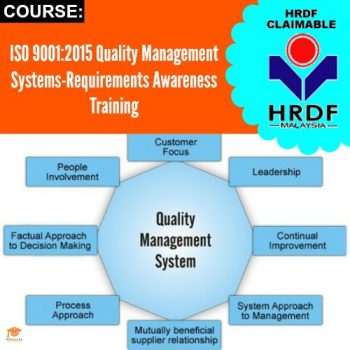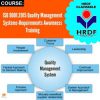ISO 9001:2015 Quality Management Systems-Requirements Awareness Training
Original price was: RM2,600.00.RM1,050.00Current price is: RM1,050.00.
 |
IntroductionThe requirements of the ISO 9000 Series of Quality Management require that appropriately qualified personnel perform the auditing task. ISO 9001, revised approximately every five years, last saw revisions in 2008. ISO 9001:2015 is the latest version. This Internal Quality Auditing course not only provides the training necessary to meet these requirements in full, but also ensures that the audit techniques learnt contribute to continuous improvement. How Will You BenefitThe aim of this training is to involve participants on several approaches in order to anticipate the new revision of ISO 9001:2015 Quality Management System requirements and prepare their organization for a smooth transition. Here are the learning objectives for the one day training program; after completing this program, participants will be able to:
Who Should AttendAny personnel with responsibility or authority for performing, receiving or managing Internal Quality Auditing Programs. The proven technique of cross auditing between departments, operations or sites requires that personnel from a wide range of activities and functional areas receive proper training in audit techniques. Personnel wishing to attend this course should have attended our introductory course or have previous knowledge of the ISO 9000 Series of standards (namely ISO 9001). MethodologyThis course has a balance of lectures, workshop sessions, and case studies and incorporates a simulated “live audit” to maximize the learning process. Module
|
Fee: RM 1,000 per pax
Loyalty Points: 1000 Points
Duration: 2 Days
Note: In-house course is available. Request it HERE
Trainer
Tejwinder Singh A/L Jujar Singh
Biodata:
With 25 years in management system development, Tejwinder is a much sought after trainer for ISO 9001, ISO 14001, OHSAS 18001 and ISO/TS 16949 ; having trained over 50,000 personnel worldwide. As a pioneer in ISO/TS 16949 quality system management development in Malaysia and Lead Tutor for IRCA approved Lead Auditor Training, Tejwinder has helped numerous organizations implement the QS 9000 and ISO/TS 16949. As a Certified Lean Six Sigma Black Belt, he presents training on Total Quality Management, Six Sigma, Lean Management, 7QC Tools, Root Cause Analysis, Innovative and Improvement Circles, Cost of Quality, Supplier Quality Management, 5S, APQP/PPAP, FMEA, SPC, MSA, 8D Problem Solving, Poka Yoke and other quality audit awareness programmes. He was involved in the assessment of TNB divisions for the TNB’s Presidential TQM Award.



